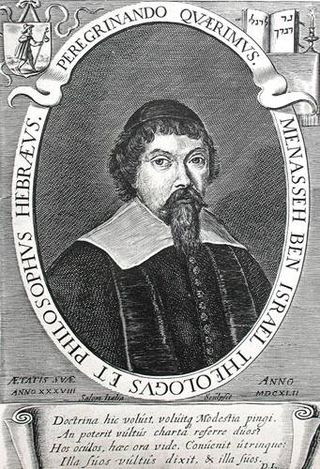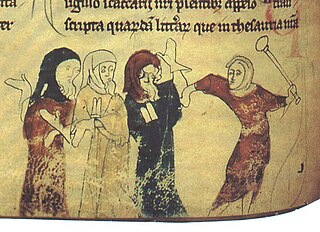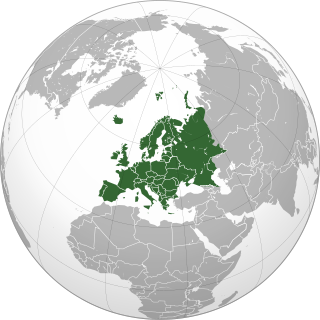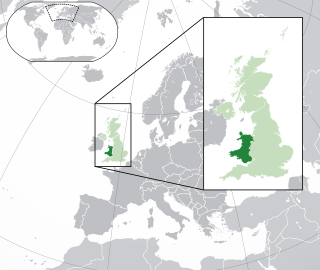This article lists expulsions, refugee crises and other forms of displacement that have affected Jews.

The history of the Jews in England goes back to the reign of William the Conqueror. Although it is likely that there had been some Jewish presence in the Roman period, there is no definitive evidence, and no reason to suppose that there was any community during Anglo-Saxon times. The first written record of Jewish settlement in England dates from 1070. The Jewish settlement continued until King Edward I's Edict of Expulsion in 1290.

Manoel Dias Soeiro, better known by his Hebrew name Menasseh or Menashe ben Israel, was a Jewish scholar, rabbi, kabbalist, writer, diplomat, printer, publisher, and founder of the first Hebrew printing press in Amsterdam in 1626.

The Edict of Expulsion was a royal decree expelling all Jews from the Kingdom of England that was issued by Edward I on 18 July 1290; it was the first time a European state is known to have permanently banned their presence. The date of issuance was most likely chosen because it was a Jewish holy day, the ninth of Ab, which commemorates the destruction of Jerusalem and other disasters the Jewish people have experienced. Edward told the sheriffs of all counties he wanted all Jews expelled before All Saints' Day that year.
The History of Sephardic Jews in England consists of the Sephardic Jews' contribution and achievement in England.
The resettlement of the Jews in England was an informal arrangement during the Commonwealth of England in the mid-1650s, which allowed Jews to practice their faith openly. It forms a prominent part of the history of the Jews in England. It happened directly after two events. Firstly a prominent rabbi Menasseh ben Israel came to the country from the Netherlands to make the case for Jewish resettlement, and secondly a Spanish New Christian merchant Antonio Robles requested that he be classified as a Jew rather than Spaniard during the war between England and Spain.

The Jewish Naturalisation Act 1753 was an Act of Parliament which allowed Jews resident in Britain to become naturalised by application to Parliament. It received royal assent on 7 July 1753 but was repealed in 1754 due to widespread opposition to its provisions.

The first Jews in England arrived after the Norman Conquest of the country by William the Conqueror in 1066, and the first written record of Jewish settlement in England dates from 1070. Jews suffered massacres in 1189–90, and after a period of rising persecution, all Jews were expelled from England after the Edict of Expulsion in 1290.

The Alhambra Decree was an edict issued on 31 March 1492, by the joint Catholic Monarchs of Spain ordering the expulsion of practising Jews from the Crowns of Castile and Aragon and its territories and possessions by 31 July of that year. The primary purpose was to eliminate the influence of practising Jews on Spain's large formerly-Jewish converso New Christian population, to ensure the latter and their descendants did not revert to Judaism. Over half of Spain's Jews had converted as a result of the religious persecution and pogroms which occurred in 1391. Due to continuing attacks, around 50,000 more had converted by 1415. A further number of those remaining chose to convert to avoid expulsion. As a result of the Alhambra decree and persecution in the years leading up to the expulsion of Spain's estimated 300,000 Jewish origin population, a total of over 200,000 had converted to Roman Catholicism in order to remain in Spain, and between 40,000 and 100,000 remained Jewish and suffered expulsion. An unknown number of the expelled eventually succumbed to the pressures of life in exile away from formerly-Jewish relatives and networks back in Spain, and so converted to Roman Catholicism to be allowed to return in the years following expulsion.:17
Antonio Fernandez Carvajal —in Portuguese: António Fernandes Carvalhal—was a Portuguese-Jewish merchant, who became the first endenizened English Jew. Carvajal and Simon de Caceres, together with other prominent members of the Sephardic community, revealed themselves as Jews by signing a petition to Oliver Cromwell asking for the right to practise their religion and bury their dead. It was to Carvajal that Cromwell gave the assurance of the right of Jews to remain in England and who appointed Carvajal as the principal agent of the English Jews.

The history of the Jews in Europe spans a period of over two thousand years. Jews, a Semitic people descending from the Judeans of Judea in the Southern Levant, began migrating to Europe just before the rise of the Roman Empire. Although Alexandrian Jews had already migrated to Rome, and with few Gentiles undergone Judaization in few occasions. A notable early event in the history of the Jews in the Roman Empire was the 63 BCE siege of Jerusalem, where Pompey had interfered in the Hasmonean civil war.
Simone (Simcha) Luzzatto (1583–1663) was a prominent rabbi in the Jewish ghetto of Venice, Italy. He shared the rabbinate of Venice with another famous rabbi, Leone de Modena.
Antisemitism in the history of the Jews in the Middle Ages became increasingly prevalent in the Late Middle Ages. Early instances of pogroms against Jews are recorded in the context of the First Crusade. Expulsions of Jews from cities and instances of blood libel became increasingly common from the 13th to the 15th century. This trend only peaked after the end of the medieval period, and it only subsided with Jewish emancipation in the late 18th and 19th centuries.
This timeline of antisemitism chronicles events in the history of antisemitism, hostile actions or discrimination against Jews as members of a religious and ethnic group. It includes events in Jewish history and the history of antisemitic thought, actions which were undertaken in order to counter antisemitism or alleviate its effects, and events that affected the prevalence of antisemitism in later years. The history of antisemitism can be traced from ancient times to the present day.

The history of the Jews in Wales begins in the 13th century. However, after the English conquest of Wales (1277–1283), Edward I issued the 1290 Edict of Expulsion expelling the Jews from England. From then until the formal return of the Jews to England in 1655, there is only one mention of Jews on Welsh soil.

On 5 December 1496, King Manuel I of Portugal signed the decree of expulsion of Jews and Muslims to take effect by the end of October of the next year.
Solomon ben Nathan Ashkenazi was a Jewish physician and businessman active in Ottoman, Venetian and Polish–Lithuanian politics during the late 16th century. Ashkenazi wielded considerable influence, most famously helping bring about the Jews' readmission to Venice in 1573.

Shylock is a fictional character in William Shakespeare's play The Merchant of Venice. A Venetian Jewish moneylender, Shylock is the play's principal villain. His defeat and conversion to Christianity form the climax of the story.
The Expulsion of Jews from Spain was the expulsion of practicing Jews following the Alhambra Decree in 1492, which was enacted to eliminate their influence on Spain's large converso population and to ensure its members did not revert to Judaism. Over half of Spain's Jews had converted to Catholicism as a result of the Massacre of 1391. Due to continuing attacks, around 50,000 more had converted by 1415. Many of those who remained decided to convert to avoid expulsion. As a result of the Alhambra decree and the prior persecution, over 200,000 Jews converted to Catholicism, and between 40,000 and 100,000 were expelled. An unknown number returned to Spain in the following years. The expulsion led to mass migration of Jews from Spain to France, Italy, Greece, Turkey and the Mediterranean Basin. One result of the migration was new Jewish surnames appearing in Italy and Greece. The surnames Faraggi, Farag and Farachi, for example, originated from the Spanish city of Fraga.

The Velho Cemetery is a disused Jewish burial ground in Mile End, London. It is the oldest surviving Jewish cemetery in the United Kingdom, founded in 1657 by members of the Creechurch Lane synagogue, which was itself the first synagogue to be established in the country since the 1290 expulsion of the Jews. The land for the cemetery was paid for by Antonio Fernandez Carvajal and Simon de Cacares.










